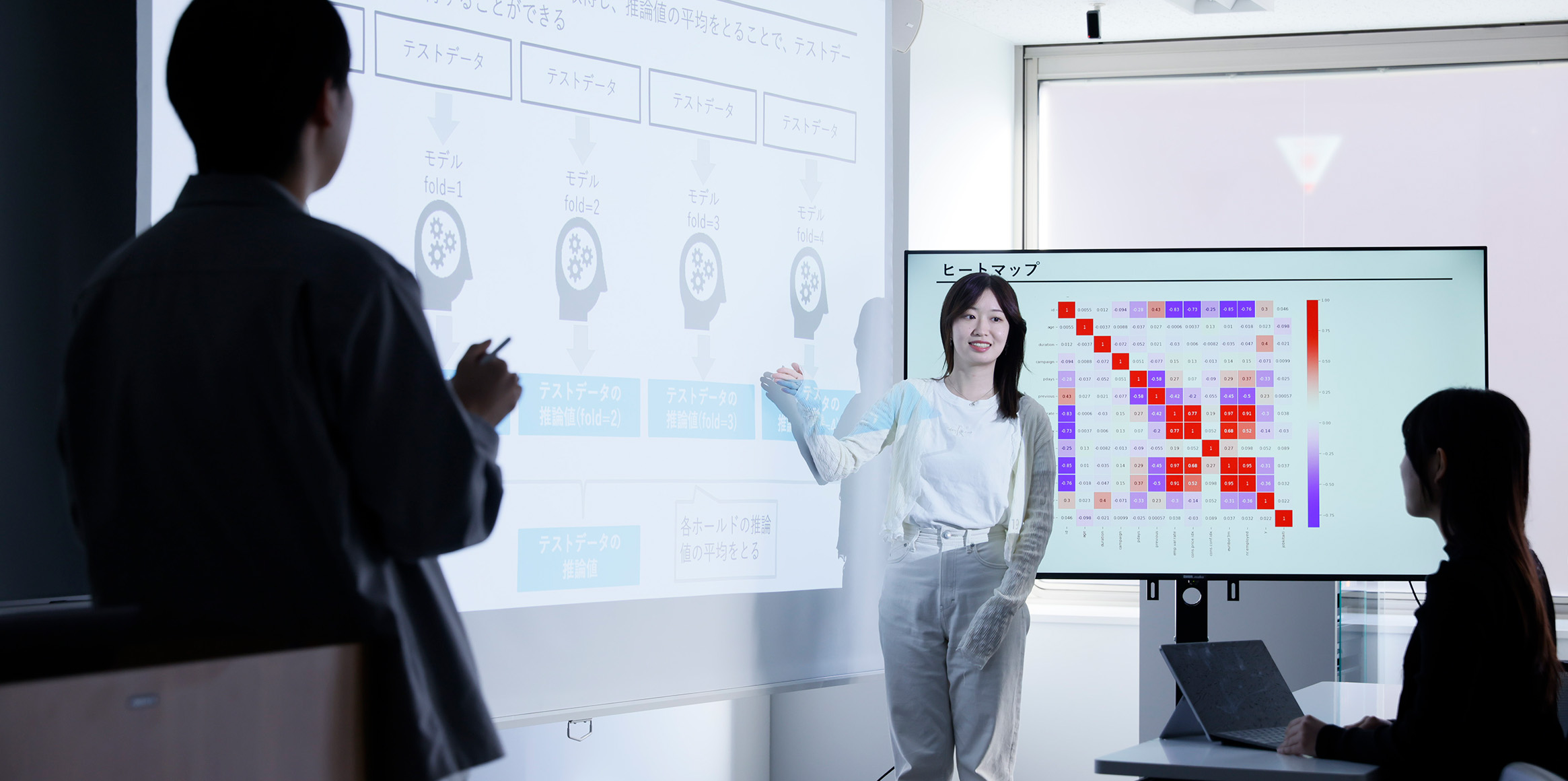In recent years, fields such as econometrics, experimental economics, game theory and finance have been forming a new core of business analysis. There is also an increasing demand for data scientists with a thorough knowledge of artificial intelligence and the utilization of big data. In the Department of Business Economics, we meet the needs of the times by providing advanced education in business analysis based on structured programs.
Research Groups & Research Areas
-
Data Analysis
Transaction data of the financial industry, big data in marketing - the amount of data available in the fields of business management and economy has been exploding in recent years. Also owing to better computer processing performance, the growth and development of these data are changing social science into a highly empirical area. In Data Analysis, you will learn how to make predictions and discover knowledge useful for business, utilizing artificial intelligence, machine learning, econometrics, computational economics, and other advanced analysis techniques.
Ando Research Group / Noguchi Research Group / Nozawa Research Group / Sugawara Research Group /Terui Research Group
-
Economics and Decision-making
Nowadays, game theory describing the social relationships among people, as well as brain science and psychological methods for clarifying people’s decision-making, provide essential support not just for the science of economics but also for social science in general. In Economic Theory, with a focus on these two frameworks that form the backbone of decision-making science, you will learn methods for theoretically analyzing various problems related to business, including consumer behavior, management organization, competitive strategies for the market, and the like.
Kishishita Research Group / Nakata Research Group / Noda Research Group / Shi Research Group / Umezawa Research Group
-
Financial Engineering
The substance of decision-making in business management and economy is probably uncertainty. In recent years, the theoretical framework for managing this uncertainty has made significant progress, and empirical methods have been developed in response. In this area, you will learn about finance, financial engineering, financial econometrics and other techniques in order to deal with the uncertainties faced in business.
Ieda Research Group / Imamura Research Group / Shimokawa Research Group / Shoji Research Group
List of Faculty Members
| Name | Title | Research Area | Keyword |
|---|---|---|---|
| ANDO Shin | Professor | Intelligent informatics | Data Mining, Machine Learning, Artificial Intelligence |
| NODA Hideo | Professor | Economic policy | |
| NOZAWA Masahiro | Professor | Statistical science Social systems engineering/Safety system |
Multivariate Analysis,Statistical Quality Control Quality Control |
| Shi Jianming | Professor | Social systems engineering/Safety system | Operations Research, Global Optimization, Sum of Linear Ratios |
| SHIMOKAWA Tetsuya | Professor | Economic theory Public finance/Public economy |
neuro-economics, computational economics |
| SUGAWARA Shinya | Professor | Public finance/Public economy | Health Economics |
| TERUI Nobuhiko | Professor | Web informatics, Service informatics Economic statistics Commerce |
|
| UMEZAWA Masashi | Professor | Social systems engineering/Safety system Economic theory |
Management Science Game theory, Industrial Organization, Microeconomics |
| IEDA Masashi | Associate Professor | Mathematical informatics Foundations of mathematics/Applied mathematics |
Mathematical Finance Stochastic Calculus |
| IMAMURA Yuri | Associate Professor | Basic analysis | Mathematical finance, Stochastic analysis |
| NAKADA Satoshi | Associate Professor | Economic theory | Game Theory, Social Choice Theory, and Microeconomics |
| NOGUCHI Rei | Associate Professor | Statistical science Life/Health/Medical informatics |
Machine Learning, Text mining, Manufacturing Data Science, Healthcare Data Science Medical Informatics, Utilization of EMR Text Data, Digital Transformation in Healthcare |
| SUZUKI Riyoichi | Associate Professor | Basic analysis | Stochastic Analysis, Mathematical Finance |
| NAKAZATO Shinji | Assistant Professor | Economic theory | Behavior economics, Computational economics. |
| SASSANO Taishi | Assistant Professor | Economic theory | Decision Theory, Behavioral Economics, Game Theory |
Information on Career Paths
-
Information Industry35.6%
-
Finance, Insurance14.4%
-
Graduate School9.1%
-
Professional and Technical Services9.1%
-
Machinery and Appliances4.5%
-
Real Estate and Goods Rental and Leasing3.0%
-
Accommodations, Eating and Drinking Services2.3%
-
Wholesale and Retail Trade2.3%
-
Academic research institutes2.3%
-
Electricity, Gas, Heat Supply and Water1.5%
-
Electronic Parts1.5%
-
Other Industries8.3%
-
Other (Persons Planning on Continuing Education, Studying Abroad, etc.)6.1%

